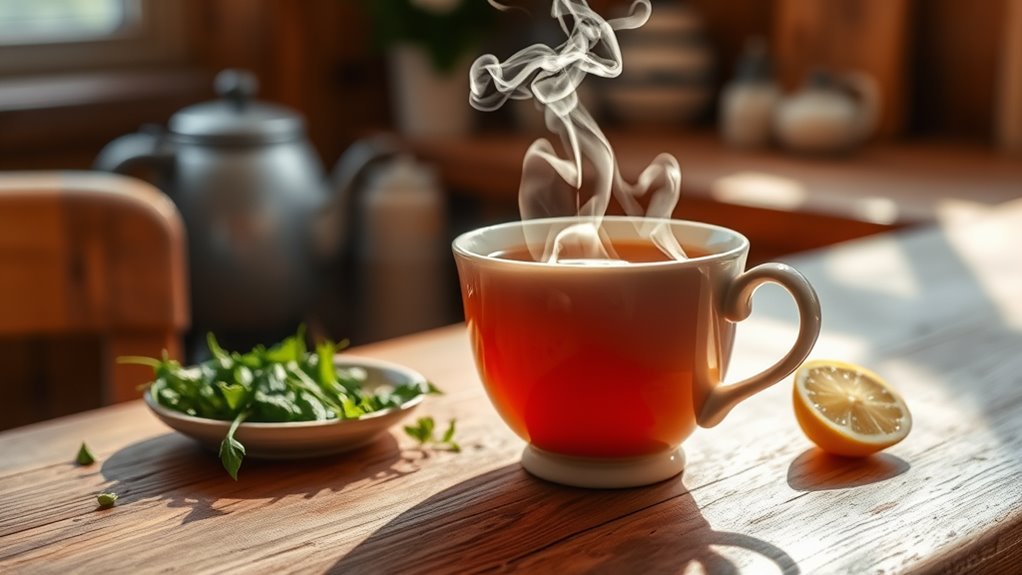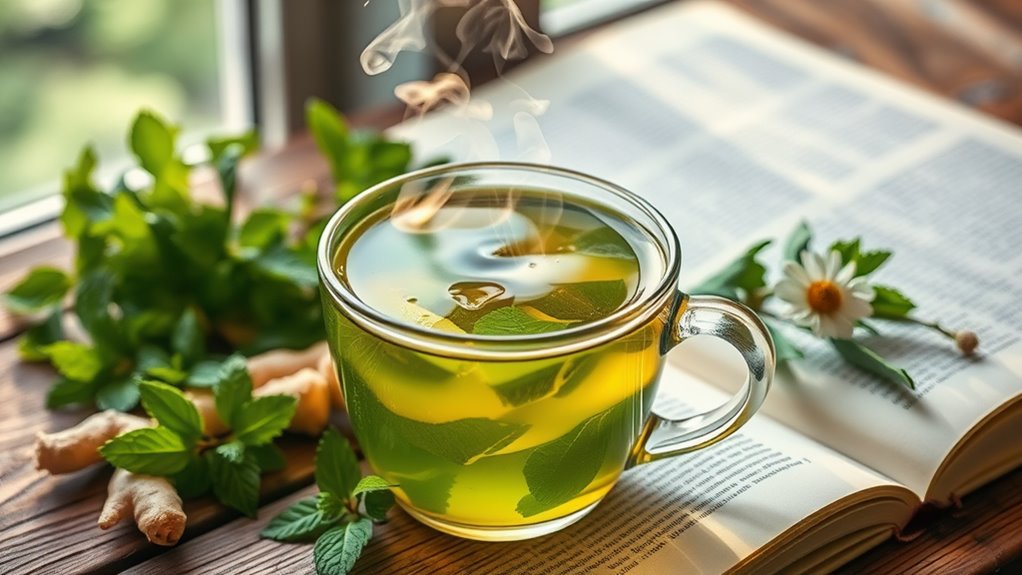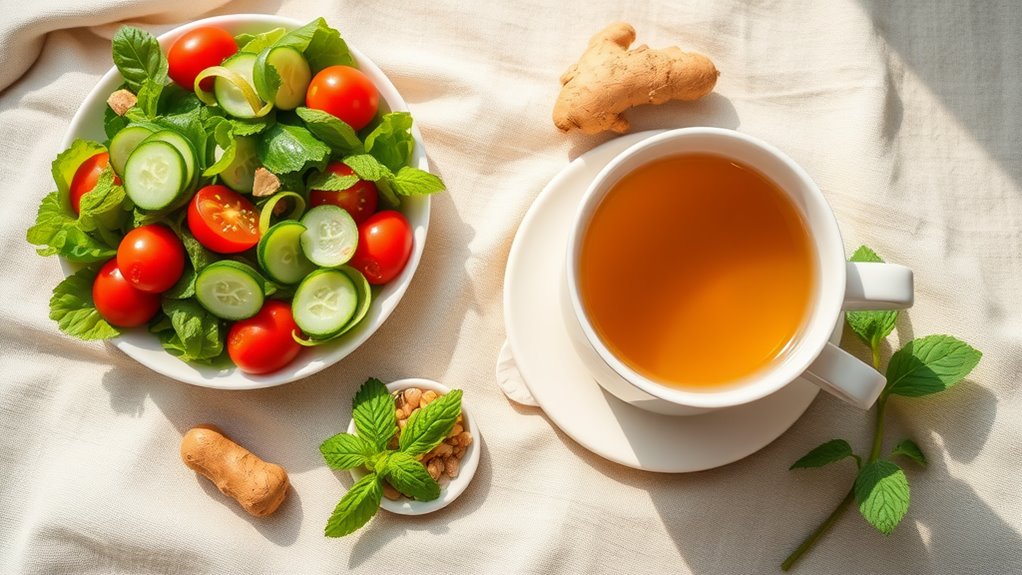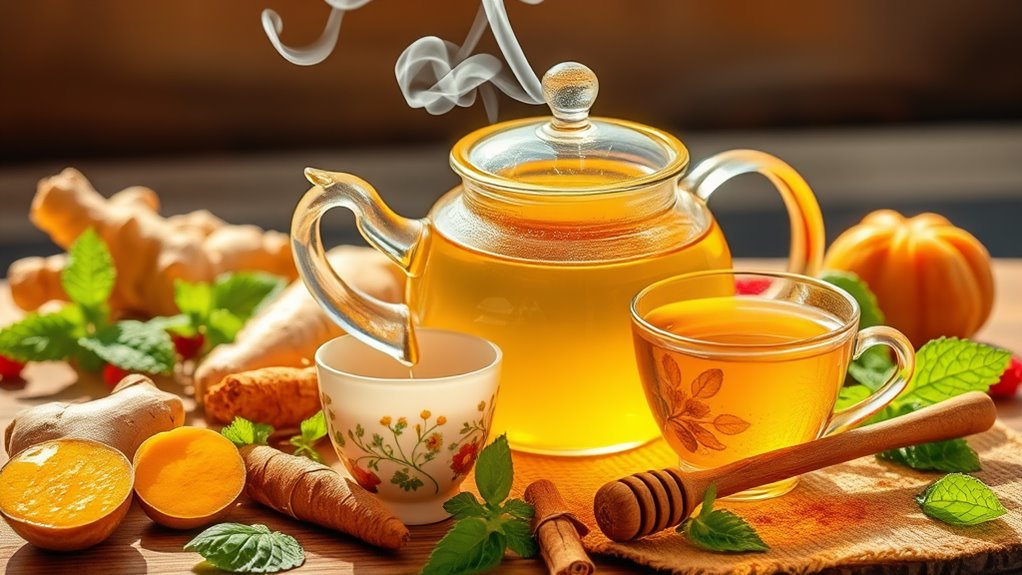Stomach Pain. This Herbal Tea Works Like a Charm!
If you’re struggling with stomach pain, herbal teas can work like a charm! Peppermint tea relaxes your gut muscles, easing cramps and bloating. Ginger tea fights nausea and promotes digestion, while chamomile tea calms your stomach. You can try blending these herbs for a soothing drink or explore traditional recipes. These natural remedies offer effective relief, and there’s plenty more to discover about how to incorporate them into your daily routine for better wellness.
Understanding Stomach Pain and Its Causes
What causes that nagging stomach pain you sometimes feel? It might be something as simple as indigestion or gas.
Maybe you overate at your favorite restaurant or indulged in rich foods. Stress can also play a huge role; when you’re anxious, your gut often reacts.
You might even be experiencing food intolerances or allergies, leading to discomfort after meals. Sometimes, it’s a sign of an underlying condition, like gastritis or irritable bowel syndrome.
Whatever the case, you’re not alone in this. Many people share these experiences, and recognizing your symptoms can help you find relief.
Understanding the root of your stomach pain is the first step toward feeling better and reclaiming your comfort.
Herbal Teas That Relieve Stomach Discomfort
When you’re dealing with stomach discomfort, herbal teas can be a soothing and effective remedy. They not only warm you up but also help settle your stomach.
Here are three herbal teas you should consider:
-
Peppermint Tea: This tea relaxes the muscles of your gastrointestinal tract, easing cramps and bloating.
-
Ginger Tea: Known for its anti-inflammatory properties, ginger tea can help reduce nausea and promote digestion.
-
Chamomile Tea: With its calming effects, chamomile can soothe your stomach and help you unwind.
These herbal options aren’t just beverages; they’re comforting companions on your journey to feeling better.
Traditional Recipes for Digestive Herbal Teas
While many herbal teas can ease stomach discomfort, traditional recipes often combine various ingredients to enhance their digestive benefits.
For instance, a soothing blend of peppermint and ginger can work wonders. Simply steep fresh peppermint leaves with a few slices of ginger in hot water for about 10 minutes.
Another comforting option is chamomile tea, which you can make by brewing dried chamomile flowers. Adding a touch of honey not only sweetens it but also adds extra soothing properties.
If you’re feeling adventurous, try a mix of fennel seeds and anise for a unique flavor that aids digestion.
Sharing these recipes with friends can create a sense of community, bringing everyone together in the pursuit of comfort and wellness.
Scientific Evidence Supporting Herbal Remedies
As you explore the world of herbal remedies, you’ll find that scientific research increasingly supports their effectiveness for alleviating stomach pain.
Many studies confirm the benefits of specific herbs, making it easier for you to trust these natural solutions. Here are three key findings:
-
Peppermint: Research shows it relaxes the muscles of the gastrointestinal tract, helping relieve cramps and bloating.
-
Ginger: Numerous studies have linked ginger to reduced nausea and improved digestion, making it a go-to for stomach discomfort.
-
Chamomile: Known for its calming properties, chamomile has been shown to reduce inflammation and promote relaxation in the digestive system.
Embracing these herbal remedies can foster a sense of community among those seeking natural relief, bringing you one step closer to feeling better.
Tips for Incorporating Herbal Teas Into Your Daily Routine
Incorporating herbal teas into your daily routine can be a simple yet effective way to enhance your overall well-being.
Start by choosing a time that works best for you, whether it’s first thing in the morning or during your afternoon break. Keep a selection of herbal teas at hand, so you can easily switch things up and discover your favorites.
Consider brewing a cup while you wind down in the evening; it’s a lovely way to relax and connect with yourself. You can even create a cozy ritual around tea time, inviting friends or family to join you.
Sharing your experiences can foster a sense of community, making the journey toward wellness even more enjoyable. Embrace the warmth of herbal tea!
Frequently Asked Questions
Can Children Drink Herbal Teas for Stomach Pain Relief?
You can let your children try herbal teas, but it’s essential to choose gentle options. Always consult a pediatrician first to ensure they’re safe and suitable for your child’s age and health. Enjoy the warmth together!
Are There Any Side Effects of Herbal Teas?
When you enjoy herbal teas, you might experience some side effects like allergies or digestive issues. It’s best to choose blends wisely and consult a healthcare professional if you’re unsure about what suits you.
How Long Does It Take for Herbal Tea to Work?
When you drink herbal tea, you might feel its effects within 30 minutes to an hour. Just relax and savor the experience; it’s all about finding the right blend that resonates with you. Enjoy!
Can I Combine Different Herbal Teas for Stomach Pain?
Absolutely, you can combine different herbal teas! Mixing flavors and benefits can enhance your experience. Just be mindful of the ingredients, and make sure they complement each other. Enjoy experimenting and find what works best for you!
Is Herbal Tea Safe During Pregnancy?
Herbal tea can be safe during pregnancy, but it’s best to consult your healthcare provider first. Some herbs might not be suitable. You want to ensure both you and your baby stay healthy and safe.





